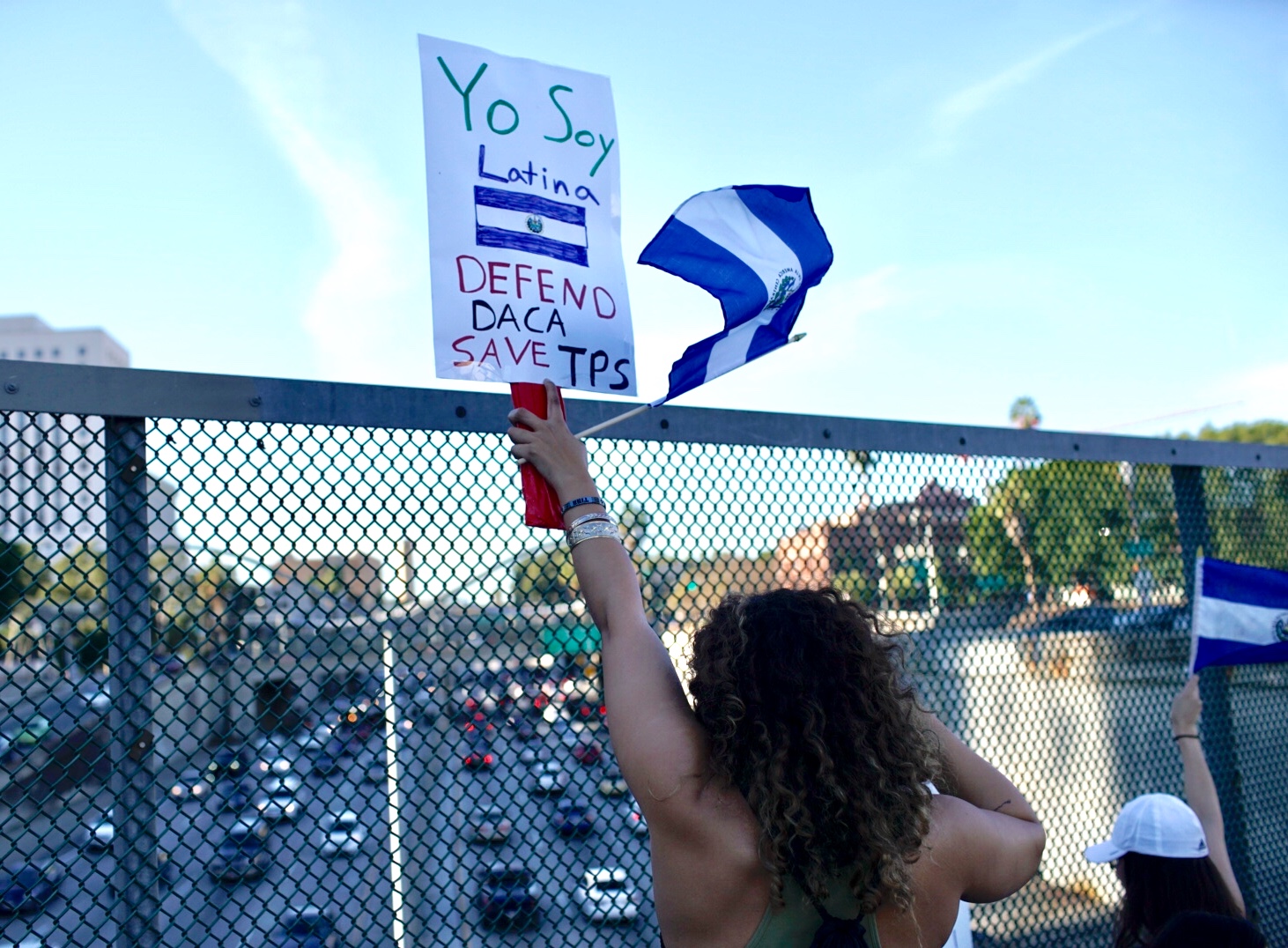A crowd in the hundreds gathered at La Placita Olvera on Saturday to oppose the Trump administration’s recent decision to terminate a temporary residency program for 200,000 Salvadorans living in the United States.
The Department of Homeland Security announced on Monday it will give Salvadorans until Sept. 9, 2019, to leave the country or find a way to obtain permanent residency. The decision has far-reaching implications for Los Angeles, which has the largest number of Salvadoran immigrants of any metropolitan area in the United States.
Some 35,000 Salvadorans who live in Los Angeles stand to lose their legal authorization to work and their protection from deportation if the humanitarian program known as Temporary Protected Status, or TPS, is revoked.
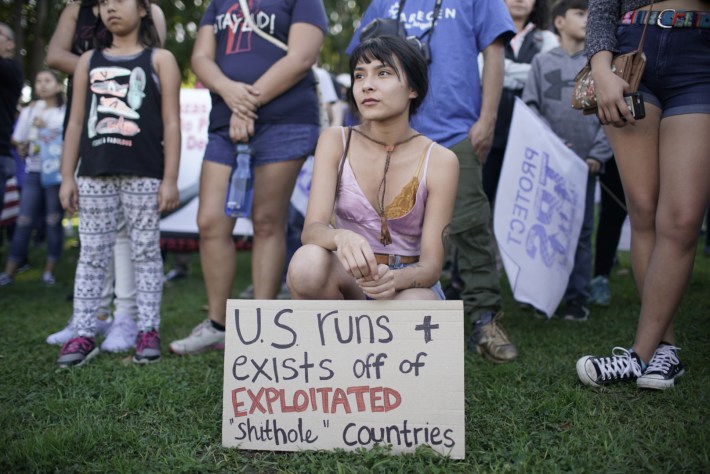
The United States extended TPS to Salvadorans after a series of earthquakes that devastated El Salvador in 2001. In the intervening 17 years, TPS holders from El Salvador have set down deep roots in Los Angeles, raised families, and formed the backbone of what is today the second-largest Latin American immigrant community in the city.
A report published last year by the Center for American Progress found that nationally TPS holders are raising families that include nearly 275,000 U.S.-born children.
One of them is Jenipher Reyes, a 16-year-old student at Maywood Academy whose mother Yesenia, a Salvadoran immigrant, supports the family working as a maid at the Hyatt Regency Los Angeles International Airport.

“My mom isn’t going to be able to work without TPS,” Reyes says. “I don’t know what’s going to happen to us. We could end up homeless.”
Contingents from organized labor and community advocacy groups were prominent in the crowd. Immigrants wore their union colors and many attended with whole families and carried the flags of their native El Salvador and Honduras.
Organized labor has a major stake in the unfolding struggle to protect TPS holders, says Hugo Soto, immigration organizer for UNITE HERE Local 11, a union that represents thousands of hotel, airport, and food service workers in Southern California. Soto says that 300 of the union’s members, including many core leaders, are TPS holders at risk of deportation.
“Immigrant women make up the bulk of our union,” Soto said. “Having these people be deported goes against everything in our DNA.”
Central Americans from El Salvador and Honduras were an integral part of the Justice for Janitors union organizing campaign in the 1990s -- memorialized in the movie “Bread and Roses.” David Huerta, president of the Service Employees International Union that led the campaign, said that many of the participants are TPS holders from El Salvador and Honduras whose protected status is now at risk.
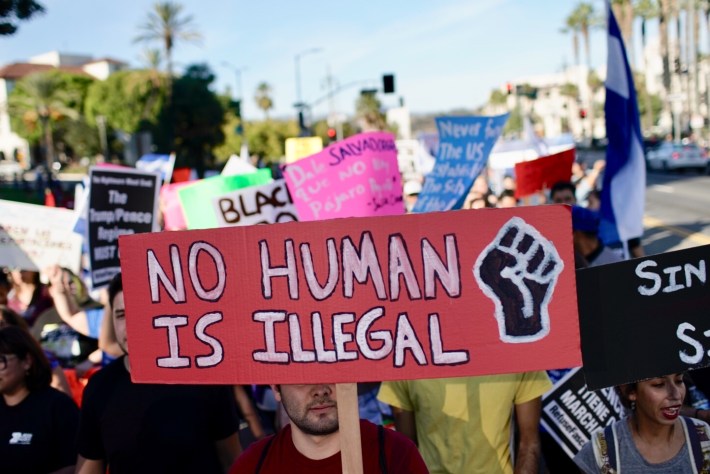
The atmosphere of the rally had the feel of a regroupment of immigrant rights forces after a series of recent setbacks dealt them by the Trump administration.
Trump’s decision to end TPS for Salvadorans comes two months after his administration canceled the program for thousands of Nicaraguans and Haitians. And Hondurans may be next. In July, Homeland Security will announce whether some 57,000 Hondurans covered by TPS will need to leave the country -- and community members are not optimistic.
“They’re taking benefits away from working people,” says Bonny Gonzalez, 23, of Hawthorne, a student at El Camino College. Gonzalez attended the rally with her mother Linda, an immigrant from Honduras. “My mother works hard, she’s not a criminal.”
ICE has publicly repudiated an Obama-era policy known as “felons not families” that made a priority of removing violent criminals over undocumented immigrants with no criminal record. Deportations have increased 25 percent in Trump’s first year in office, and immigration arrests have increased 30 percent, according to a study by PolitiFact.
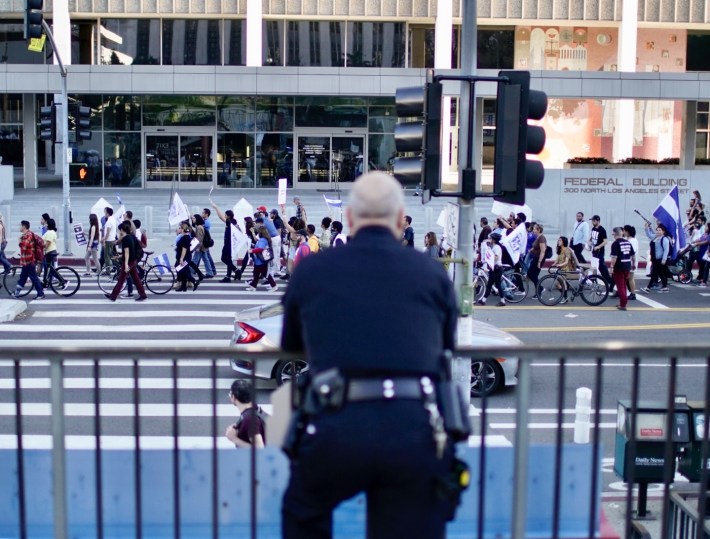
The crowd appeared incensed at a racist remark that Trump reportedly made at a White House meeting earlier in the week when he demanded to know why he would want to admit “all these people from shithole countries,” and not, say, people from countries like Norway.
Trump’s remark struck many at the rally as proof that a racial ranking of immigrants exists as a motive for the rescinding of TPS, and it lent an unmistakable edge to the rally on Saturday.
The Los Angeles area has an estimated 1 million undocumented immigrants. The feeling in the crowd and that expressed by many of the speakers is that there is strength in numbers.
“We have a president that’s racist,” said Martha Arevalo, executive director of the Central American Resource Center, during her speech at the rally. “We’re going to march, we’re going to fight, we’re going to get arrested, and we’re going to vote.”
Trump’s insulting language tore the scab off long-standing grievances against U.S. policy in Central America and Haiti. One woman stood in the front row holding up a handmade sign that read, “The U.S. Funded the Civil War in El Salvador.”
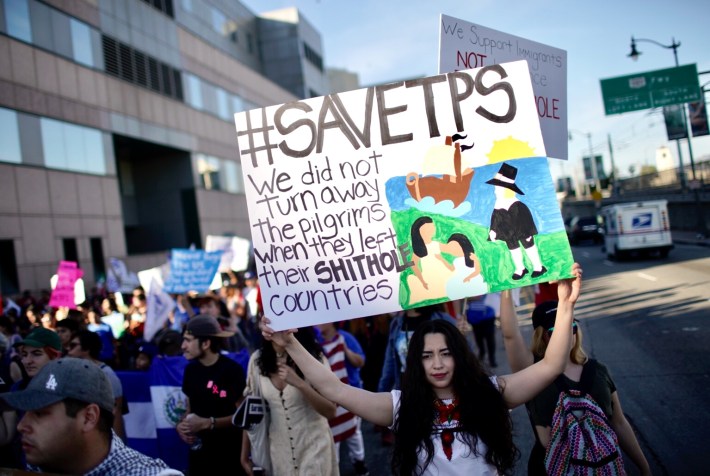
Many of the speakers emphasized the importance of generating voter turnout for Democrats in the midterm elections and supporting pro-immigrant legislation in Sacramento and Washington, DC. But not everyone in the crowd agreed with supporting Democrats. A group of activists in the crowd briefly attempted to drown out the remarks of Congressman Jimmy Gomez and L.A. City Councilman Gil Cedillo with a chant that called for a break with the Democratic Party.
The Los Angeles area has an estimated 1 million undocumented immigrants. The feeling in the crowd and that expressed by many of the speakers is that there is strength in numbers. As a woman who attended the rally wrapped in a Honduran flag told me, “If all the Latinos in Los Angeles stop working the city won’t have anything to eat.”
The crowd of roughly 200 that gathered at 2 p.m. for the rally had easily doubled in size at 4 p.m. when a march set off for the federal immigration lockup at Aliso and Alameda. The marchers chanted as they walked, “Aquí estamos y no nos vamos, y si nos echan, nos regresamos.”
Most Americans have still never heard of TPS, the latest in a list of acronyms from within the bureaucracy of U.S. Citizenship and Immigration Services. Its anonymity could be temporary.
The stakes are higher now, and the pressure is rising.
